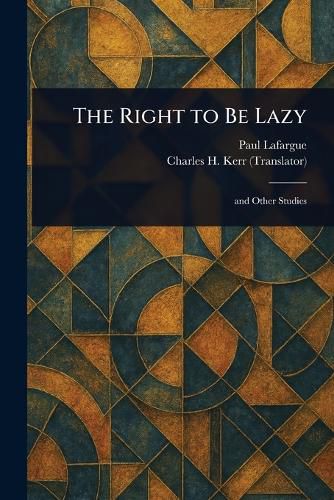Readings Newsletter
Become a Readings Member to make your shopping experience even easier.
Sign in or sign up for free!
You’re not far away from qualifying for FREE standard shipping within Australia
You’ve qualified for FREE standard shipping within Australia
The cart is loading…






This title is printed to order. This book may have been self-published. If so, we cannot guarantee the quality of the content. In the main most books will have gone through the editing process however some may not. We therefore suggest that you be aware of this before ordering this book. If in doubt check either the author or publisher’s details as we are unable to accept any returns unless they are faulty. Please contact us if you have any questions.
"The Right to be Lazy and Other Studies" by Paul Lafargue is a provocative and enduring critique of work and its place in modern society. This collection of essays delves into the subject of labor, challenging conventional notions of productivity and the value placed on relentless toil.
Lafargue, a prominent voice in socialist thought, examines the economic systems of capitalism and their impact on the working class. He offers a compelling argument for shorter work hours and a re-evaluation of our relationship with labor. His writing sparks debate on the fundamental principles of economics and the very nature of work.
This carefully prepared print edition allows readers to explore Lafargue's influential ideas on labor, leisure, and the societal structures that shape our lives. It offers a historical perspective on enduring questions about the purpose of work and the pursuit of a fulfilling existence. This volume is relevant to anyone interested in economics, political philosophy, and the history of labor movements.
This work has been selected by scholars as being culturally important, and is part of the knowledge base of civilization as we know it.
This work is in the public domain in the United States of America, and possibly other nations. Within the United States, you may freely copy and distribute this work, as no entity (individual or corporate) has a copyright on the body of the work.
Scholars believe, and we concur, that this work is important enough to be preserved, reproduced, and made generally available to the public. We appreciate your support of the preservation process, and thank you for being an important part of keeping this knowledge alive and relevant.
$9.00 standard shipping within Australia
FREE standard shipping within Australia for orders over $100.00
Express & International shipping calculated at checkout
This title is printed to order. This book may have been self-published. If so, we cannot guarantee the quality of the content. In the main most books will have gone through the editing process however some may not. We therefore suggest that you be aware of this before ordering this book. If in doubt check either the author or publisher’s details as we are unable to accept any returns unless they are faulty. Please contact us if you have any questions.
"The Right to be Lazy and Other Studies" by Paul Lafargue is a provocative and enduring critique of work and its place in modern society. This collection of essays delves into the subject of labor, challenging conventional notions of productivity and the value placed on relentless toil.
Lafargue, a prominent voice in socialist thought, examines the economic systems of capitalism and their impact on the working class. He offers a compelling argument for shorter work hours and a re-evaluation of our relationship with labor. His writing sparks debate on the fundamental principles of economics and the very nature of work.
This carefully prepared print edition allows readers to explore Lafargue's influential ideas on labor, leisure, and the societal structures that shape our lives. It offers a historical perspective on enduring questions about the purpose of work and the pursuit of a fulfilling existence. This volume is relevant to anyone interested in economics, political philosophy, and the history of labor movements.
This work has been selected by scholars as being culturally important, and is part of the knowledge base of civilization as we know it.
This work is in the public domain in the United States of America, and possibly other nations. Within the United States, you may freely copy and distribute this work, as no entity (individual or corporate) has a copyright on the body of the work.
Scholars believe, and we concur, that this work is important enough to be preserved, reproduced, and made generally available to the public. We appreciate your support of the preservation process, and thank you for being an important part of keeping this knowledge alive and relevant.